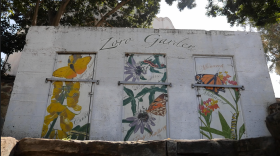There are now 19 detainees with confirmed cases of COVID-19 in the privately-run Otay Mesa Detention Center, which houses civil immigration detainees and those in U.S. Marshal’s custody. 15 of those are immigration detainees. Eight staff members have also tested positive.
Last Friday, two weeks after the first employee tested positive,the center’s operator, CoreCivic, first began distributing protective masks to detainees.
The company says its guards asked a group of female detainees to sign contracts in English that it called “acknowledgement forms.” Those would potentially free CoreCivic from any complications that might arise from wearing the masks.
If the women wouldn’t sign, they wouldn’t receive the masks.
The women began to protest the contracts, and one woman was on a phone call when she said the group was pepper-sprayed. She said the women were also being asked to pay for t-shirts they had turned into face masks.
The group Pueblo Sin Fronteras released a recording of the call on Facebook.
“They want to force us to sign so that we throw away the masks, they want to charge us for t-shirts we used to make the masks,” the unidentified woman said in the recording. “They are spraying pepper spray into the cells.”
RELATED: Immigration Detention Facilities Could Become Coronavirus Hot Spots
CoreCivic told KPBS that the allegations of the use of pepper spray are “patently false.”
Ian Seruelo is an attorney for one of the women who was protesting, an asylum-seeker from Mexico. She was taken into solitary confinement after the protest.
“Those who were the noisier or more assertive of the detainees were the ones that they arrested and put in isolation, including my client,” Seruelo told KPBS. “They started to put them in isolation to pressure them to stop what they’re doing. It’s really outrageous.”
Eventually, CoreCivic provided masks to the women without having them sign the contract. CoreCivic says it is now providing educational handouts to explain that the masks do not completely protect a detainee from COVID-19.
On Sunday, U.S. Senator Kamala Harris criticized the Otay Mesa Detention Center for failing to adequately protect its detainees, releasing a statement saying that the “horrifying conditions” there are unacceptable.
Harris also called on Immigration and Customs Enforcement to release as many detainees as possible during the pandemic.
“Every day that officials continue to lock up low-risk and vulnerable people is another day that people in U.S. custody along with countless facility and court personnel, legal representatives, witnesses, and family members are put at risk of a preventable death from a deadly virus,” Harris wrote.
Over the weekend, the ACLU and other organizations secured the release of four immigration detainees who were particularly vulnerable to COVID-19.
KPBS has learned that a hunger strike among detainees is planned for Wednesday.







